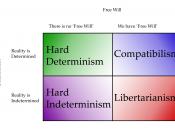"If two-way communication across time is possible then it must be possible to know in advance what one will do and what will happen. If so, Taylor's story of Osmo could be realized- fatalism is unavoidable."
It is believed by many that time travel is physically possible. Such a belief brings with it a plethora of paradoxes, and importantly, brings into question conceived notion of human freedom. However as Aubrey Townsend, in his paper "Time Travel, Freedom and Deliberation", brings to our attention the same paradoxes of human freedom occur if two-way communication between times is possible as opposed to actual travel between times, in both cases we have advanced knowledge of the future. Such a possibility closely resembles the story of Osmo as presented in by Richard Taylor in his paper "Determinism, Freedom and Fate". I will argue that if we are able to gain foreknowledge of our own future, through for instance a two-way communicator through time, then we are condemned to fatalism.
The doctrine of Fatalism is an ancient one which dictates that human freedom is illusory, what ever happens is, and always was unavoidable. As opposed to the common view of the future as full of possibilities the fatalist thinks of the future as something eternal and unchangeable.
The idea of time travel is not as absurd as some may believe, and if we can conceive of the idea of human travel across time then why not the ability to send messages across time? If we grant the existence of a two-way communicator across time then in order for this to be possible two metaphysical considerations must be met. The first; the acceptance of four-dimensionalism, namely, we must grant the notion that other times are equally as real as other places, in this sense...



Nice paper
This is nicely written paper and provides important information about Richard Taylor's paper Freedom, Determinism and Fate
0 out of 0 people found this comment useful.